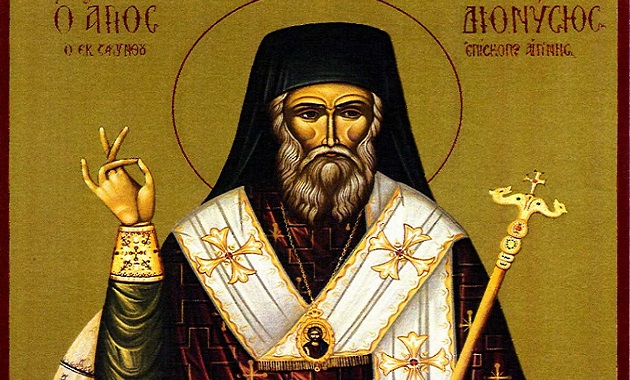A Saint who Lied to Save his Brother’s Murderer, St Dionysios, Bishop of Aegina
17 December 2013Saint Dionysios, Bishop of Aiyina (Aegina), the Wonder-Worker from Zakynthos (17 December)
The Saint who Lied to Save his Brother’s Murderer.
A young man from an eminent family left the things of this world and went into a monastery. This is not so common, not only today, but at any time. The norm is good social standing, the young man to do the same work as his father and to continue the family tradition. But there are young people who depart from this norm even though their parents may protest and react against their decision. As Christ says, “Let those who are able to accept”. Never of course, with their own will and power alone, but always armed and strengthened with divine grace.
Basil the Great had this to say regarding young people who decide to follow the monastic path: “Those who are led to obedience to Christ early and hasten to the poor and untroubled life are truly wonderful and blessed”. So Saint Dionysios, who was revealed as a shining star in his younger years, was wonderful and blessed, as were so many other martyrs and saints who lived after the fall of Constantinople. It was divine providence that he should support the captive Orthodox Christians in their tribulations.
Saint Dionysios was born in Zakynthos in 1547, of parents who were distinguished on the island for their high social standing and sound financial position. At an early age, the saint of God left all this behind, social status and wealth, and entered the Monastery of Our Most Holy Lady The Joy of All, which is in Strofadia, two small vine-covered islands in the Ionian Sea, to the south of Zakynthos.
When he had completed his monastic training and had already been ordained priest, Saint Dionysios set off on a pilgrimage to the Holy Land. His itinerary took him through Athens, and the then Metropolitan of the city, Nikanoras, who saw and esteemed the spirituality and virtues of the Hieromonk Dionysios, kept him at his side and soon selected and consecrated him as Bishop of Aiyina. In the old town of Aiyina you can still see the stone throne from which Saint Dionysios preached to the Christians. The saint of God guided his spiritual flock, as the Holy Scriptures say “with knowledge”, that is as a true and good shepherd of the Church. The island of Aiyina is a blessed place which has been trodden and sanctified by two holy Fathers of the Church: in those days, Saint Dionysios; and in our own time, Saint Nektarios, the Bishop of Pentapolis. Both of them were granted the grace to perform miracles, which is why both of them are honoured in the Church with the title “Wonder-Worker”.
After he had served his diocese for some time, Saint Dionysios resigned and went back to Zakynthos, where he spent the rest of his life as the abbot of the monastery of the Anafonitria. This means that a real monk, even if he reaches the rank of hierarch and is consecrated bishop, never forgets, but always remembers that, first and foremost, he is a monk. In the monastery of the Anafonitria the saintliness of the man of God shone anew. One day, a man came to his cell, a fugitive who was trembling and seeking protection. His hands were covered in human blood: he had just murdered the brother of Saint Dionysios. When the saint heard this, he naturally wept within himself, and let some tears fall externally, but then he stood up, opened the back door to his cell and let the murderer escape, hide and survive. This is a unique and distinctive action in the lives of the Saints of the Church, for which there is no human measure for us to judge it against. Even more, when the relatives of the murdered man- and of Saint Dionysios, of course- as well as the civil authorities, came to his cell and asked about the murderer, Saint Dionysios pretended not to have seen him and not to know anything. This is why, in a poem extolling the virtue of the saint and wondering at his example, a Zakynthian poet wrote: “the servant of God was sanctified at the moment he sinned”. The saint’s sin was that he concealed his brother’s murderer and said that he had not seen him. This is why we say that there is no human measure against which to judge the action of Saint Dionysios. There is only one measure: the words of Christ, when He says “Love your enemies”. Anything beyond that has nothing to do with us; it is left to God’s judgement.
Saint Dionysios paid the common debt to life and “departed in peace” in 1624, that is at the age of 77. In accordance with his wishes, his remains were buried at the monastery of his repentance, on Strofadia. When, years later, they wanted to translate his holy relics, the body was found to be whole and intact, clad in his episcopal vestments, just as he had been buried, and giving off a spiritual and sanctified fragrance. His relics were later taken to Zakynthos, where they now lie and are reverenced by the faithful in the church to dedicated to his name, that of Saint Dionysios. In 1703, after petitions and reports confirming his many miracles and the belief and conviction of the local church concerning his sanctity had been sent by the clergy and people of Zakynthos, the Holy Synod of the Ecumenical Patriarchate officially recognized Saint Dionysios as a saint and entered him in the Church calendar. He is honoured and celebrated by the faithful and the name of God is glorified, He Who “is wonderful in His saints”, now and forever and unto the endless ages Amen.
Metropolitan Dionysios of Servia and Kozani, Εικόνες Έμψυχοι, pp. 440-4.







